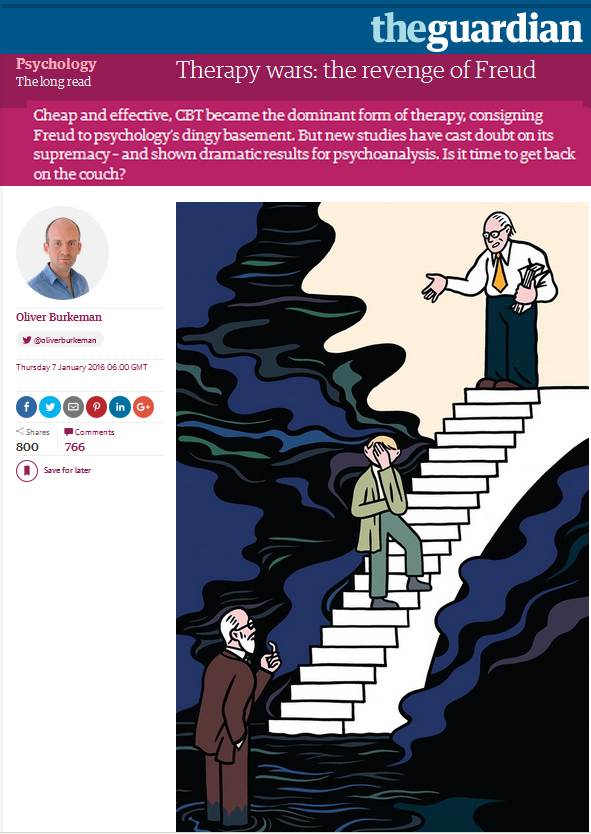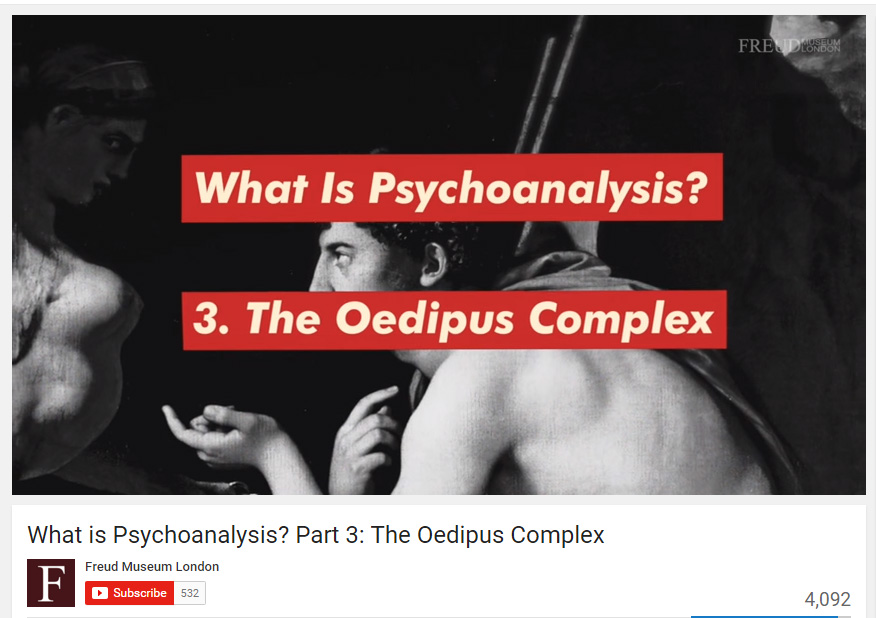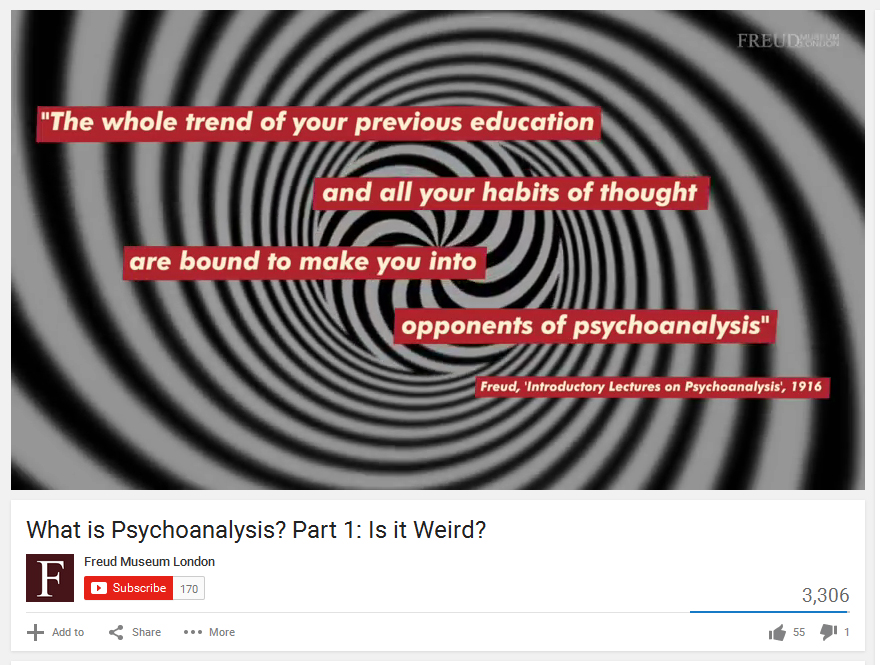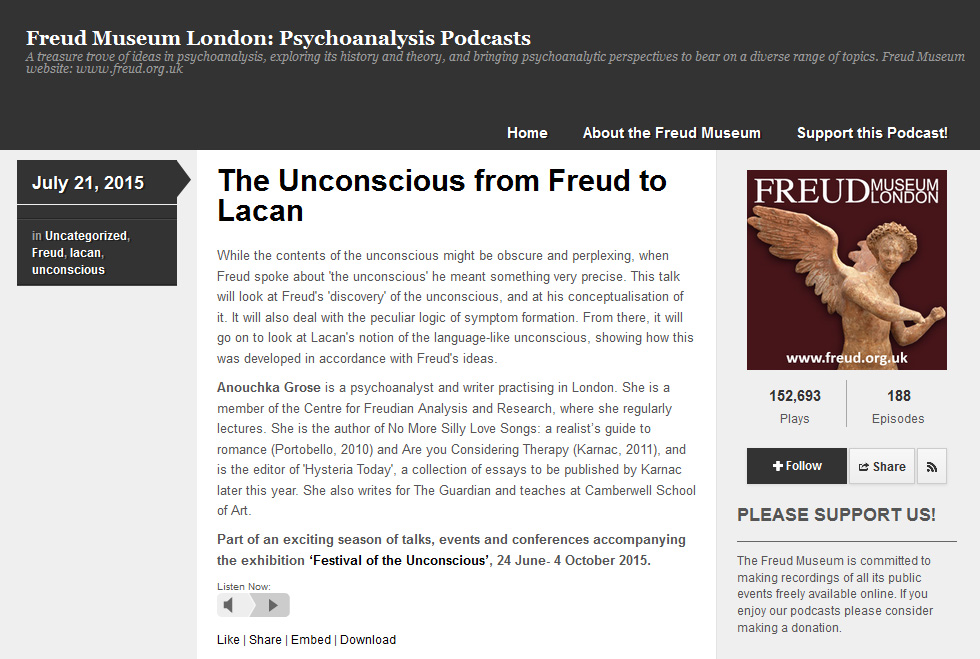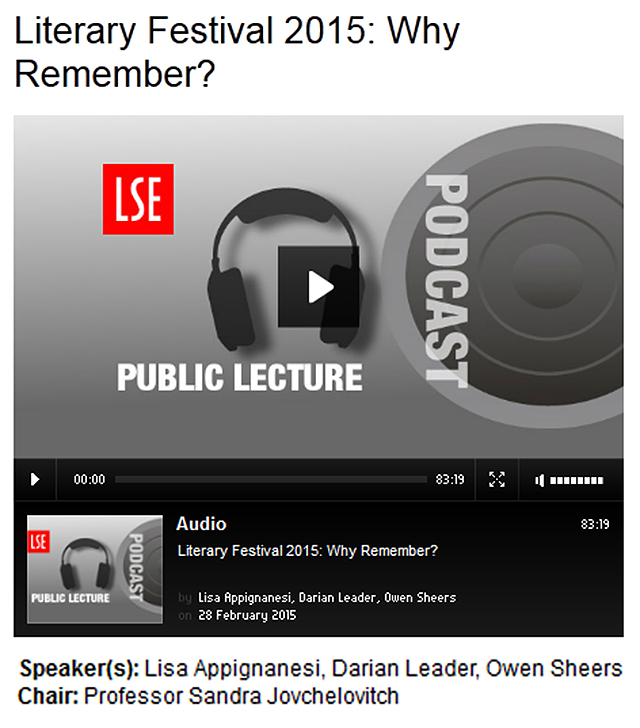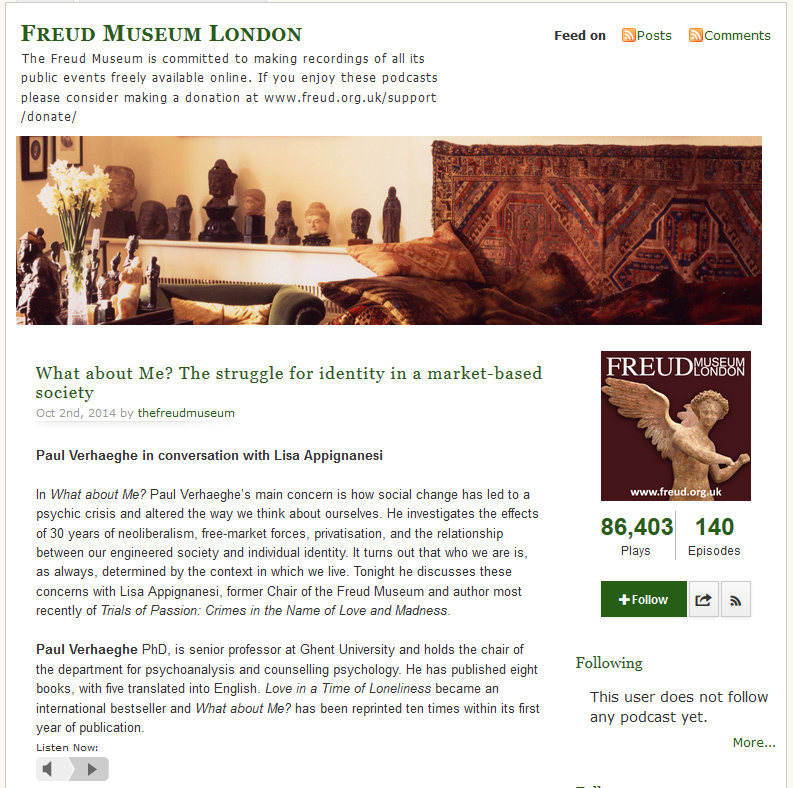Recorded at the launch event of Lambeth and Southwark MIND psychotherapy clinic, psychoanalyst and author Anouchka Grose talks with Ajay Khandelwal about her life, the difficulties that took her into analysis as well as her subsequent training and practice as a psychoanalyst.
Tag Archives: psychoanalysis
Darian Leader on Psychosis introduced by Ajay Khandelwal
Introduced by Ajay Khandelwal, psychoanalyst Darian Leader gives the Lambeth and Southwark MIND Psychotherapy Clinic 2016 Annual Lecture – On Psychosis.
Therapy Wars: The Revenge of Freud – Guardian Article by Oliver Burkeman
[Click here to visit the Guardian site and read Oliver Burkeman’s article.]
Cheap and effective, CBT became the dominant form of therapy, consigning Freud to psychology’s dingy basement. But new studies have cast doubt on its supremacy – and shown dramatic results for psychoanalysis. Is it time to get back on the couch?
“…researchers at London’s Tavistock clinic published results in October from the first rigorous NHS study of long-term psychoanalysis as a treatment for chronic depression. For the most severely depressed, it concluded, 18 months of analysis worked far better – and with much longer-lasting effects – than “treatment as usual” on the NHS, which included some CBT. Two years after the various treatments ended, 44% of analysis patients no longer met the criteria for major depression, compared to one-tenth of the others.”
What is Psychoanalysis? Part 3: Oedipus Complex – Freud Museum London
Click here to see the third part of the Freud Museum introductory video series on psychoanalysis.
IN THIS EPISODE:
The emotional world of children
His Majesty the Baby
The mother as first love object
Is it sexual?
Jealousy, rivalry, hatred and anxiety
The role of the father
Gender: Freud didn’t think you were just ‘born a boy’ or ‘born a girl’
There is no perfect resolution of the Oedipus complex
It marks us for life
More info: www.freud.org.uk/education/
What is Psychoanalysis? Part 1: Is it Weird? Freud Museum London
[Click here to view the Freud Museum video on YouTube]
Series trailer for Freud Museum introductory videos on psychoanalysis featuring interviews with analysts including John Forrester, Anne Worthington, Dany Nobus, Darian Leader, Astrid Gessert, Daniel Pick and Anouchka Grose.
Anouchka Grose: The Unconscious from Freud to Lacan
[Click here to visit the Freud Museum Site and hear the Podcast]
While the contents of the unconscious might be obscure and perplexing, when Freud spoke about ‘the unconscious’ he meant something very precise. This talk will look at Freud’s ‘discovery’ of the unconscious, and at his conceptualisation of it. It will also deal with the peculiar logic of symptom formation. From there, it will go on to look at Lacan’s notion of the language-like unconscious, showing how this was developed in accordance with Freud’s ideas.
Anouchka Grose is a psychoanalyst and writer practising in London. She is a member of the Centre for Freudian Analysis and Research, where she regularly lectures. She is the author of No More Silly Love Songs: a realist’s guide to romance (Portobello, 2010) and Are you Considering Therapy (Karnac, 2011), and is the editor of ‘Hysteria Today’, a collection of essays to be published by Karnac later this year. She also writes for The Guardian and teaches at Camberwell School of Art.
Why Remember? LSE Podcast with Lisa Appignanesi, Darian Leader & Owen Sheers
[Click here to go the the LSE site and listen to the podcast.]
Speaker(s): Lisa Appignanesi, Darian Leader, Owen Sheers
Chair: Professor Sandra Jovchelovitch
Recorded on 28 February 2015.
This panel explores our relationship with our sometimes traumatic past, and asks why we should remember and what happens when we can’t remember. The discussion considers the importance of place and landscape in memory, as well as the nature of collective memory and memorialisation, particularly in the context of war.
Lisa Appignanesi (@LisaAppignanesi) is a writer, novelist and broadcaster. She is the former Chair of the Freud Museum London, the former President of English PEN and former Deputy Director of London’s Institute of Contemporary Arts. Her non-fiction includes Mad, Bad and Sad: A History of Women and the Mind Doctors (which won the BMA Award for the Public Understanding of Science amongst other prizes), the acclaimed family memoir Losing the Dead, the classic study Freud’s Women (with John Forrester) and Simone de Beauvoir, and most recently Trials of Passion: Crimes in the Name of Love and Madness. Her novels include Paris Requiem, The Memory Man and The Dead of Winter. Lisa Appignanesi was awarded the OBE in 2013.
Darian Leader is a psychoanalyst working in London and a founder member of the Centre for Freudian Analysis and Research. He is President of the College of Psychoanalysts-UK and Visiting Professor at the School of Human and Life Sciences, Roehampton University. He is the author of several books including: Introducing Lacan, Why do women write more letters than they post?; Freud’s Footnotes; Stealing the Mona Lisa: What Art Stops Us From Seeing, Why do people get ill?’ (with David Corfield), The New Black: Mourning, Melancholia and Depression and What is Madness? His most recent book, Strictly Bipolar was published by Hamish Hamilton in 2013.
Owen Sheers (@owensheers) has written two collections of poetry, The Blue Book and Skirrid Hill, which won a Somerset Maugham award. His verse drama Pink Mist won Wales Book of the Year and the Hay Festival Poetry Medal. His non-fiction includes The Dust Diaries and Calon: A Journey to the Heart of Welsh Rugby. His first novel Resistance has been translated into ten languages and was made into a film in 2011. His plays include The Passion, The Two Worlds of Charlie F. and Mametz. Owen wrote and presented BBC Four’s A Poet’s Guide to Britain. He has been a NYPL Cullman Fellow, Writer in Residence for the Wordsworth Trust and Artist in Residence for the Welsh Rugby Union. His second novel I Saw A Man will be published by Faber in 2015
What about Me? The struggle for identity in a market-based society – by psychoanalyst Paul Verhaeghe
Psychoanalyst Adam Phillips: Poetry as Therapy
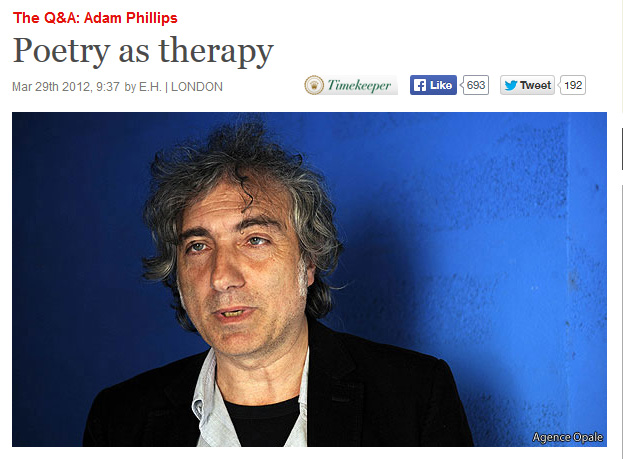 Adam Phillips: “On the one hand, psychoanalysis is practical in the sense that there is an attempt to solve a problem, or to cure somebody, or at least to address their suffering. But the other thing that psychoanalysis does is that the project is to enable somebody to speak. It’s the attempt to create the conditions in which somebody can speak themselves as fully as possible.”
Adam Phillips: “On the one hand, psychoanalysis is practical in the sense that there is an attempt to solve a problem, or to cure somebody, or at least to address their suffering. But the other thing that psychoanalysis does is that the project is to enable somebody to speak. It’s the attempt to create the conditions in which somebody can speak themselves as fully as possible.”
[Click here to read the whole article on The Economist site]
Interview with Psychoanalyst Eric Laurent
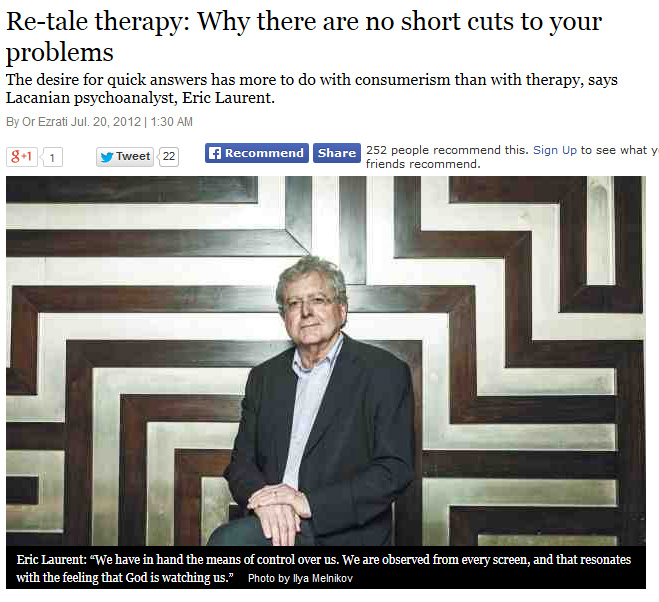 Click here to read the whole of the article on the Haaretz website.
Click here to read the whole of the article on the Haaretz website.
Q: What actually gets lost when someone takes his symptoms to a cognitive psychologist?
Laurent: “I can tell you where I do not agree with my colleagues from the ethical viewpoint. I am opposed to the behavioral aspect that exists in the usual combination of cognitive-behavioral therapy. The patient is liable to find himself in a confrontation with a powerful authority who tries to impose a behavioral change with a ‘one size fits all’ approach. As though good behavior exists that can be standardized. That is not only harmful to the subject, it is genuinely dangerous to the ideals of freedom. In 1971, at the height of the behaviorist ‘craze,’ Skinner [B.F. Skinner, the father of behaviorism] told Time magazine that freedom is a luxury we can’t afford.
